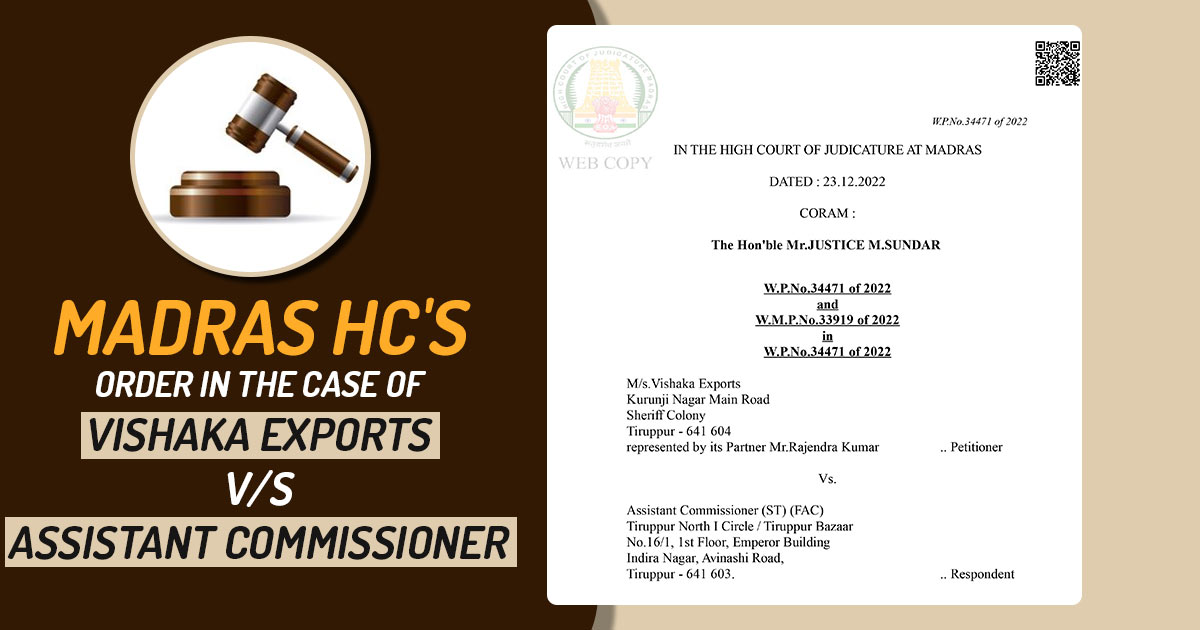
The Madras High Court in the matter of Vishaka Exports vs Assistant Commissioner (ST) (FAC), deliberated on the problem of whether the difference between GSTR-3B and GSTR-1 forms entitled as “errors apparent on the face of the record” and whether they can be rectified u/s 161 of the Tamil Nadu Goods and Services Tax Act, 2017 (TN-G&ST Act).
Background:- Vishaka Exports, the applicant, contested an order on June 22, 2022, issued by the Assistant Commissioner under section 73 of the TN-G&ST Act. The applicant is a registered assessee and the order was based on differences in their GSTR-3B and GSTR-1 monthly returns for the AY 2018-2019. Particularly, the differences related to turnover differences, input mismatches, and additional corresponding issues.
Legal Points:
The counsel of the applicant raises three major points against the impugned order-
Lack of Preceding Forms GST DRC-01 and GST DRC-01A:- It was claimed by the applicant that the impugned order was not been preceded via these forms, which are required under the norms.
No Show Cause Notice (SCN) Issued:- The applicant claimed that no Show Cause Notice was issued before making the impugned order.
Petitions for Rectification are Pending:- The applicant has filed a rectification petition u/s 161 of the TN-G&ST Act, which was still pending.
Deliberation of the court- The scope of the petition has been considered by the court, observing that a counter affidavit from the respondent was unnecessary because of the clear instructions and narrow focus of the matter.
Forms GST DRC-01 & 01A:- The applicant quoted a previous order (Shri Tyres vs State Tax Officer) where identical cases led to the impugned order being interfered with. However, the court remarked on an amendment to Rule 142 of the TN-G&ST Rules effective from October 15, 2020.
The amendment revised the wording from “proper officer shall” to “proper officer may”, making the issuance of these forms discretionary instead of mandatory. The same amendment has been recognized by the court and corrected its previous stance, exhibiting that the issuance of these forms is no longer obligatory.
SCN (Show Cause Notice):- The court referenced previous rulings under the Tamil Nadu Value Added Tax Act (TNVAT Act), which was subsumed by the GST regime. The court ruled that issuing an SCN is not imperative for all modifications under the GST Act, equivalent to specific provisions under the TNVAT Act.
Even after the claim of the applicant of no personal hearing, the court encountered that a personal hearing is not needed legally, and hence, this point did not hold.
Rectification Petition:- Issues of output mismatch between GSTR-3B and GSTR-1 and unreversed credit notes in GSTR-3B have been addressed by the rectification application of the applicant on 13th July 2022.
It is investigated by the court if such issues comprised errors apparent on the face of the record. The court elaborated that these errors are those that are apparent and real, requiring no inferential procedure to fetch. The difference cited by the applicant does not attain this criterion and was considered the grounds for the plea instead of rectification.
Conclusion of the Court
The writ petition has been dismissed by the court but preserved the applicants right to file the legal petition under section 107 of the TN-G&ST Act. The same petition shall be within the limitation durations and pre-deposit prerequisite. The applicant has been permitted by the court to make a prayer u/s 14 of the Limitation Act, 1963, to aim the exclusion of time spent on the writ petition from the plea limitation period.
The court remarked that the application of rectification was filed within 1 month, but the same was disputed whether it was within the defined three-month duration. The court does not adjudicate on the same timing issue, as the main conclusion was that the rectification grounds did not authorize “errors evident on the face of the record”.
Final Order: The writ petition and the related miscellaneous petition without costs have been dismissed by the court, carrying the applicant’s rights to appeal under the TN-GST Act.
Key Takeaway: The matter emphasizes the distinction between errors that can be rectified under section 161 of the TN-G&ST Act and those that are to be addressed via the appellate process. The court supported the principle that only clear, self-evident errors are entitled to rectification, while differences demanding detailed examination are grounds for appeal.
| Case Title | Vishaka Exports v/s Assistant Commissioner |
| Case No. | W.P.No.34471 of 2022 |
| Date | 23.12.2022 |
| Counsel For Appellant | Mr.T.R.Ramesh |
| Counsel For Respondent | Mr.T.N.C.Kaushik Additional Government Pleader |
| Madras High Court | Read Order |